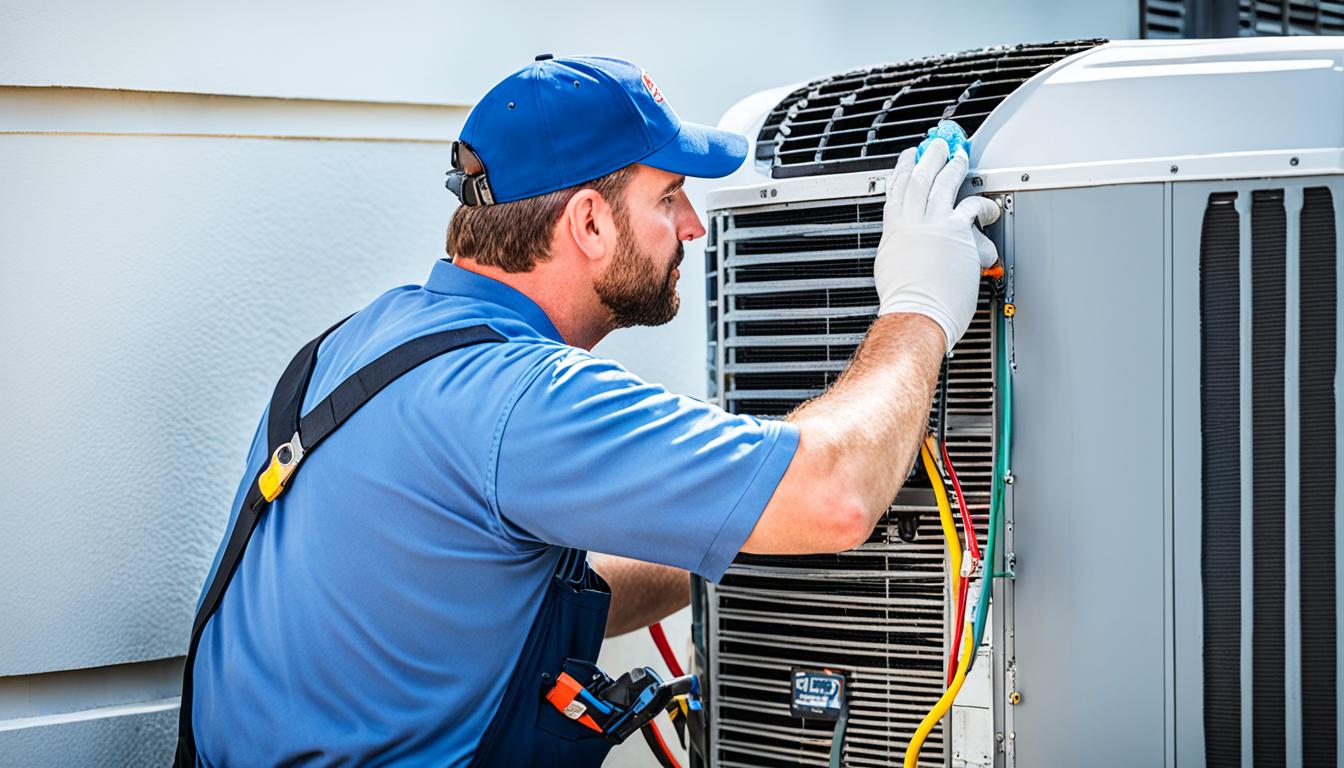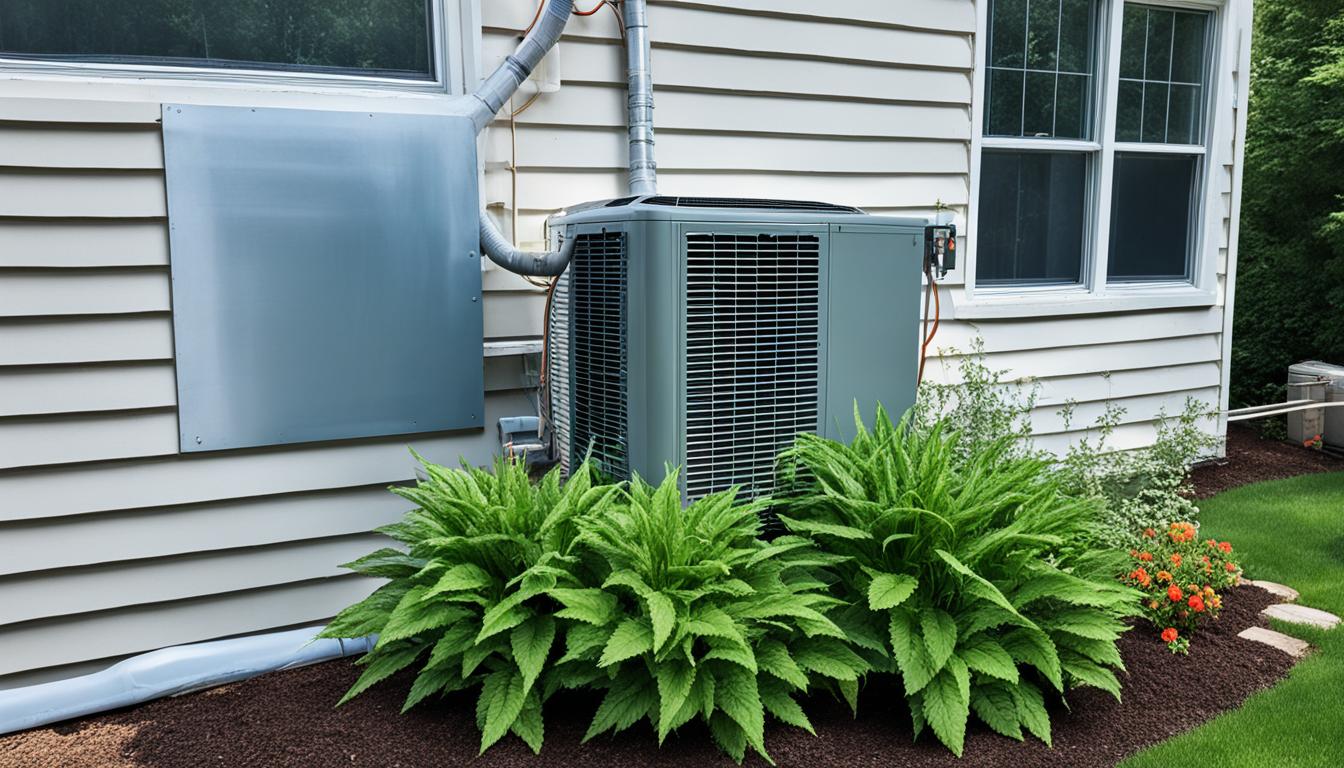In Florida, we know all about humidity. But most of us would rather keep it outside our houses. Having too much humidity indoors is more than just uncomfortable. It causes mold, mildew, health problems, bugs, and harm to your stuff. Plus, it spikes your cooling bills.1 Want to lower the humidity in your house? This article covers the causes of indoor humidity, the right humidity for Florida homes, and how you can make your house less humid.
Key Takeaways
- The ideal indoor humidity level for Florida homes is between 45% and 55%.
- Excessive indoor humidity above 55% can lead to mold, insect problems, and health issues.
- Outdoor humidity in Florida can reach up to 90%, contributing to high indoor humidity.
- Proper AC maintenance and the right system size are crucial for effective dehumidification.
- Investing in insulation, dehumidifiers, and monitoring indoor humidity levels can all help reduce moisture indoors.
Understanding Indoor Humidity in Florida
Florida’s warm, humid weather means homes often have high indoor humidity.2 This can affect comfort and health.3 Florida ranks second in the U.S. for humidity, with levels averaging 74.5 percent.3 Across the state, humidity usually reaches about 75 percent, but some places can hit 90 percent.
Factors Contributing to High Indoor Humidity
Poor ventilation, wrong-sized AC units, and a lack of AC maintenance can up indoor humidity.2 It’s key to have good ventilation in damp zones like bathrooms.2 Also, fixing leaky pipes is a must to lower humidity indoors.2
Ideal Indoor Humidity Levels for Florida Homes
For Florida homes, keeping humidity between 45% and 55% is perfect.3 In Southwest Florida, staying within this range helps prevent health problems and mold.3 Although 55% may seem high, remember that1 outdoor humidity can be as high as 90% in Florida.
Consequences of Excessive Indoor Humidity
High humidity alongside hot temperatures in Florida can lead to discomfort and health issues.3 Too much indoor humidity may cause property damage, mold, health problems, and spike energy bills.3 To avoid these, stick to the 45-55% rule for indoor humidity.
While low humidity is rare in Florida, it can lead to dry skin and breathing problems.3 Florida’s climate, along with poor ventilation and AC systems, contributes to indoor humidity issues.
Improve Ventilation and Airflow
Good airflow is key to reducing humidity in Florida homes. Use exhaust fans in the kitchen and bathrooms.4
Run these fans when cooking or showering. They help remove excess moisture. After you’re done, let the fans keep running for 15 more minutes.4
Use Exhaust Fans Regularly
Today’s houses are well sealed to save energy. But this can keep bad air and moisture inside. An energy recovery ventilator fixes this by replacing indoor air with fresh, clean air. This reduces odors, humidity, and pollutants in your home.
Install an Energy Recovery Ventilator
An energy recovery ventilator boosts your home’s air quality. It pulls out old, damp air and pulls in new, fresh air. This process lessens smells, moisture, and pollutants. As a result, your home feels more pleasant.
Maintain Your Air Conditioning System

It’s important to keep your air conditioning system working well, especially in Florida. It cools and removes moisture from the air, making your home comfortable.5
Schedule Regular AC Maintenance
Make time for regular AC maintenance with a pro.5 This maintenance stops dirt from blocking key parts, like the evaporator coil. A clean system is better at taking moisture out of your home’s air.6
Ensure Proper AC Unit Size
Choose the right size AC for your home to help with humidity. If it’s too big, it cools quickly but doesn’t remove much moisture. Short cycles are bad for humidity control.5
How To Reduce Humidity In House In Florida?
If you live in Florida, you understand the battle against high humidity. This climate problem can cause mold, insects, and health issues. But, you can fight back and make your home more comfortable. A dehumidifier is an excellent choice for this.1
Use Dehumidifiers
A dehumidifier is your secret weapon in Florida’s damp environment. It can directly lower the humidity in your home. For small areas, a portable dehumidifier works well. If you need it for the whole house, consider a unit that connects to your air system. It can cover your entire home’s humidity needs.7 You should have a professional install these bigger systems.1
Portable vs Whole-House Dehumidifiers
Both portable and whole-house dehumidifiers are great at reducing humidity in house. The portables are best for one-room jobs. For large spaces, the whole-house type is unbeatable. Your choice depends on your home’s size and what you need.1
Insulation and Air Sealing
Being in Florida, I’ve seen how bad high humidity can mess with indoor comfort and energy use. But, the right insulation and sealing can change the whole game. They help control moisture and keep the temperature steady inside.8
Benefits of Proper Insulation
The Department of Energy says insulation is key for managing humidity and keeping the house at an even temperature.9 This steadiness prevents extra moisture and keeps us feeling good. Plus, it makes the space healthier.9
Air leaks can make up 25-40% of your heating and cooling costs at home.8 By adding insulation and sealing up the cracks, you fight these leaks. This eases pressure on your AC and heater, making them work better. As a result, you save energy.8
I chose Allweather Insulation for top-notch service that’s covered Tallahassee since 1955. They offer more than just meeting the standard.8 Working with them, I’ve improved my home’s insulation. This means more comfort and saving money.
Lifestyle and Behavioral Changes
As a Floridian, I know the struggle with high home humidity. Upgrading HVAC systems and using dehumidifiers is good. But, simple lifestyle changes also help. These changes keep indoor moisture down. So, let’s look at a few key strategies.
Limit Indoor Moisture Sources
Areas like bathrooms, kitchens, and laundry rooms are key spots. They boost indoor humidity.10 Even if dryers vent outside, inside drying releases too much moisture. So, outdoor line-drying is a great solution.11
Dry Clothes Outdoors
Drying clothes outside lowers indoor moisture. It’s also eco-friendly.11 This change can really help control your home’s humidity.
Manage Houseplants
Plants boost air quality indoors but add to humidity.12 By covering the soil of potted plants, you can cut down on humidity.
These changes reduce humidity in Florida homes. They make your living space more cozy and healthy. Tackling excess moisture at its sources is crucial. It helps keep the perfect indoor humidity for your family.
Inspect for Leaks and Moisture Sources
A small leak at home can make the air too damp.1 Check your pipes often to ensure they work well.13 Look closely at areas like the attic to find places needing a seal.13 Fix leaks immediately or get professional help.
Rooms which are often wet like kitchens or bathrooms can make your whole home too moist.14 Check your roof often to stop leaks that increase indoor moisture.14 Use bath fans and stove vents to lower the dampness.13
Buy a hygrometer to watch the indoor wetness; they are cheap, sometimes only $10.1 It helps you find and fix areas with too much moisture quickly.
| Key Strategies for Inspecting Leaks and Moisture Sources |
|---|
| Regularly inspect pipes and plumbing for any signs of leaks1 |
| Conduct detailed inspections in the attic and between living spaces and the attic13 |
| Pay close attention to moisture-prone areas like kitchens, bathrooms, laundry rooms, and basements14 |
| Consider investing in a hygrometer to monitor indoor humidity levels1 |
| Run bath fans and stove vents regularly to manage moisture levels13 |
| Schedule regular roof inspections to identify any leaks contributing to high humidity14 |
Stay alert and fix any leaks or damp spots you find. This is a great way to keep your home’s air from getting too wet.1 It helps make your living space more pleasant.
Adjust Air Conditioner Settings
Living in Florida, I’ve experienced how the high humidity makes our homes feel sticky.6 Luckily, changing our air conditioner settings can fix this issue.
Utilize Dry Mode
Many air conditioners have a “dry mode” option.6 Turning this feature on helps take the extra moisture out of your home. It works by the AC compressor running more, removing air humidity as it cools.6 Using dry mode is a fast and efficient way to reduce indoor humidity, making your home more pleasant.
Simply adjust your AC settings to focus on dehumidifying.6 Experimenting a bit will show the best cooling and dehumidifying mix. This way, you can enjoy a comfier home all year.
Change Air Filters Regularly
It’s really important to change your air conditioning filter often.15 Doing this will keep your AC running well and boost airflow.15 Plus, better airflow means less moisture in your home.
In warm states like Florida, filters get dirty fast. This is due to high humidity and heat.16 So, it’s critical to change these filters often to keep your air clean and your system in top shape.16
In Florida, swapping filters out each month is a good rule of thumb.17 But homes with pets or people with allergies might need to change filters more.17
Fiberglass filters cost less but need changing more often.15 Pleated filters, although cost a bit more, help your air quality more.15
Changing filters often is also good for your wallet.16 It helps your air system work less hard, saving you on energy bills.16 Ignoring this can make your energy bills go up, due to your system working too hard.16
Dirty filters can make your AC struggle with humidity and cause blockages.15 This could lead to leaks or harm to your system.15
Having pros like Greens Energy Services check and clean your filters is wise.15 They’re top-notch in Orlando, offering great HVAC care. They have a perfect 5/5 from 1717 reviews.15
Changing filters regularly means your HVAC system stays healthy.16 It also protects your system during bad weather in Florida, keeping it safe from damage.16
Conclusion
Living in Florida means always dealing with high indoor humidity. But, I’ve learned ways to lower it and make my home more comfortable. I work on better ventilation, take care of my AC, and use dehumidifiers. These steps, along with some lifestyle changes, help a lot.18
Experts advise keeping humidity levels between 30 to 50 percent. This prevents dangerous mold, structural harm, and health issues.18 I also use smart home tech, like humidity-detecting thermostats,18 to watch over my home’s humidity. This allows me to easily tweak settings as needed.
Keeping the right humidity level in my Florida home is tough but doable. Thanks to the tips in this article, I have the knowledge I need. With these strategies, I can make my living space healthier and more pleasant. Exploring additional resources for indoor humidity management would be helpful too. They can offer more tips and support for keeping my Florida home’s humidity in check.
FAQ
What causes high indoor humidity in Florida homes?
What is the ideal indoor humidity level for a Florida home?
How can I improve ventilation in my home to reduce humidity?
How does regular air conditioning maintenance help with humidity control?
Should I use a dehumidifier to lower humidity in my home?
How does proper insulation help control humidity?
What lifestyle changes can I make to reduce humidity in my home?
How can adjusting my air conditioner settings help lower humidity?
Source Links
- https://www.climatedesign.com/blog/how-to-lower-humidity-in-a-florida-home/
- https://sansone-ac.com/expert-tips/10-tips-removing-humidity-home/
- https://onewayairfl.com/ideal-humidity-florida/
- https://www.delair.com/blog/improving-the-airflow-in-your-sanford-florida-home/
- https://aplusairconditioning.com/blog/5-tips-remove-humidity-florida-home/
- https://www.allamerican-homeservices.com/blog/5-ways-to-lower-your-florida-homes-humidity-using-ac/
- https://edcprofessionalhomeinspections.com/blog/how-to-lower-humidity-in-your-house/
- https://allweather-insulation.com/importance-of-air-sealing-florida-home/
- https://www.homeofintegrity.com/blog/managing-humidity-in-your-florida-home/
- https://www.floridahealth.gov/\/environmental-health/indoor-air-quality/_documents/iaq-tenants-guide-eli-10-17.pdf
- https://www.wfla.com/bloom-tampa-bay/breathe-easy-in-the-sunshine-state-the-benefits-of-humidifiers-in-florida/
- https://www.rheem.com/air-conditioning/articles/managing-your-homes-humidity/
- https://hvac-talk.com/vbb/threads/1439371-Humidity-problems-in-FL-Attic-a-moisture-source
- https://www.mrhandyman.com/blog/2018/july/help-my-home-is-humid-musty/
- https://greensenergy.com/blog/change-hvac-air-filter/
- https://veteranshvac.com/blog/the-importance-of-changing-hvac-air-filters-in-florida
- https://blairsair.com/how-often-should-you-change-your-air-filter-in-your-florida-home/
- https://www.floridarealestatecentral.com/blog/indoor-humidity-management-guide/

